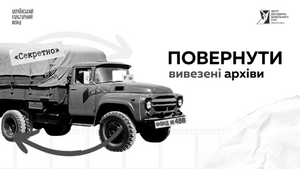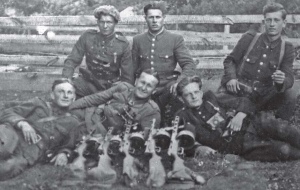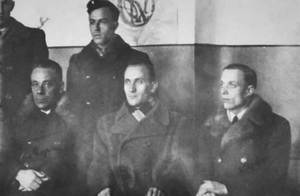The Directory: Who, Why, How?
In the summer of 1918 the opponents of Hetman Pavlo Skoropadsky regime who had assembled in Ukrainian National Union (UNUnion) became politically radicalized. Opposition activists embarked on plotting an armed rebellion. The Directory (Directorate) — the rebellion executive body — was formed late night on November 13, 1918.
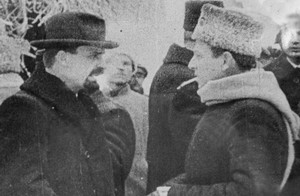
Name. According to one of the activists of anti-hetman uprising and a participant of the session that formed the Directory of Ukraine, the name "Dyrektoria" had, allegedly, been taken on the example and by analogy of the five-member revolutionary committee, which governed the French Republic in the end of the 18th century.
This version was elaborated upon by Matviy Stakhiv in his work "Ukraine in the times of the Directory", and, later, it was "semi-automatically" cited by other diaspora, and Ukrainian historians.
However, the link between The Directory of Ukraine and French le Directoire — chronologically separated by half of a century — is way too farfetched, especially, since there were much closer examples and analogies.
The closest example of revolutionary government body called Directory was five-member Crimean Tatar Directory headed by Noman Çelebicihan formed by Crimean Tatar Executive Assembly (Qurultay) on January 13 (26), 1917. This collegiate committee lasted until the end of December 1918 and, upon occupation of Crimea by Bolshevik troops, was virtually liquidated.
 |
| One of the first proclamations by UNR Directory. November 20, 1918 |
Russian models of the time could have also served an example for the Directory of Ukraine. First and foremost, it was a five-member St. Petersburg Directory (Council of five) that was in power during the Russian Provisional Government crises September-October 1917. Council of five was headed by Aleksander Kerensky, with Mykhailo Tershchenko as the Minister of Foreign Affairs.
In those times there were two more Directory examples in Russia. In September 1918 Ufa Directory, also known as the "Provisional All-Russian Government", was formed. It was supposed to perform the role of supreme executive body till return of the All-Russian Constituent Assembly, and dissolved itself in November 1918.
Another Directory, or "Provisional Siberian Government", headed by Pyotr Derber controlled Siberia and Far East July to November 1918.
In times of Ukrainian revolution of 1917—1921 another Directory existed on the Ukrainian soil, though at a little later date — the Subcarpathian Rus Directory headed by Grygoriy Zhatkovych. It was a five-member provisional advisory body with the Military Czech Administration of Subcarpathian Rus. It was founded on October 12, 1919, and acted till February 19, 1920.
Place. Elections to the Directory of Ukraine were held in secret. The session that formed the Directory took place at the Ministry of Railways at 34 Shevchenko boulevard (called Bibikov boulevard at the time). Previously the building was owned by the Tereshchenko's family.
Here, the above mentioned Minister of Foreign Affairs of the Provisional Government of Russia and a member of Russian Directory (Council of Five), Mykhailo Tereshchenko, spent his childhood.
Under the Central Council (Rada) [of Ukraine] the building was handed over to the General Secretary of Railroads of the Ukrainian People's Republic (UNR), later - the Ministry of Railways. And, at some point, minsters resided in several of the building's rooms.
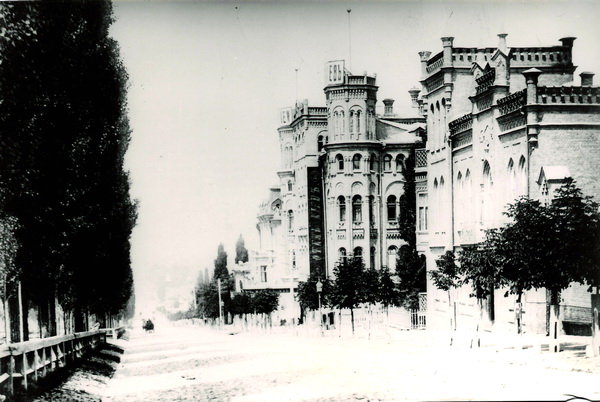 |
| Building, where the Directory was formed (34 Shevchenko Boulevard, Kyiv) |
The place was chosen for a number of reasons. Future Directory member Andriy Makarenko ( who was also the Head of Railway Workers' Union) worked at the Ministry as a head of department.
He had his own office at the Ministry, which granted him free access to the building. Starting June 1918 railway security corps was being formed within the Ministry of Railways. Security corps was under the command of General Oleksandr Osetsky, who joined the conspirators.
Special Issues Ministry's officer O. Stokoza, and his particular importance to the matter, are also worth mentioning.
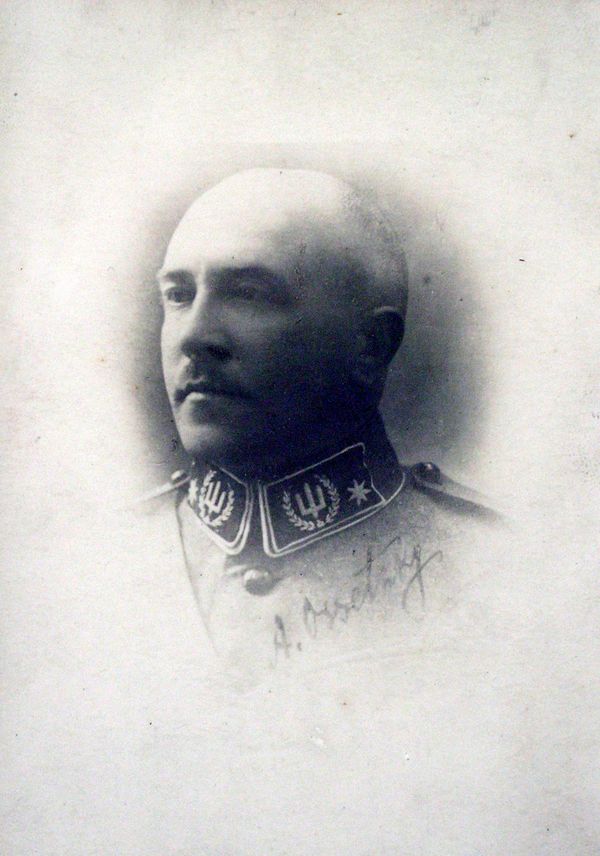 |
| General Oleksandr Osetsky, the Republic's Army Chief of Staff |
Date. The date of the session that formed the Directory varies from source to source. For instance, Volodymyr Vynnychenko in his book "Rebirth of the Nation", as well as "Ukrayina" newspaper editorial point to November 13, Rostyslav Lashchenko in his memoirs states November 14 as the date, and Mykyta Shapoval – November 15.
The simplest of calculations point to the evening of November 13, and not to a later date. Had the session taken place on November 14 or 15, it would definitely mention the Hetman's federation charter of November 14, and appointment of the new Government headed by Sergiy Gerbel, who was openly pro-Russian. However, nothing of the above was mentioned in the session.
Also, in the evening of November 14, the Directory member Fedir Shvets was seen at the Kyiv train station, as he was leaving for Bila Tserkva.
We must also take into account that in Serhiy Herbel Government Railway portfolio was reassigned to Emil Landberg replacing Borys Butenko; meanwhile, on November 13 Borys Butenko was still the "master" of the house. Though he did not belong to any republican party, Butenko was openly pro-Ukrainian.
Who. Who attended the session and what was its status? Mykyta Shapoval mentions, at one point, that there convened "the presidium of the UNUnion, representatives of military (namely, Sich Riflemen) and parties that offered their services", the other time he writes that Directory was formed at "a session of the Ukrainian National Union Council".
The "Ukraina" newspaper in an article "How the Directory was elected" states that the session was convened on the initiative of "V. Vynnychenko and M. Shapoval on behalf of the National Union" at the building of the Ministry of Railways, where "assembled Ukrainian figures, representatives of the Ukrainian National Union and Ukrainian parties", who elected the Directory. Probably, the term "on behalf" would be the most accurate in this case; now let's figure out exactly who attended the November 13's session at the Ministry of Railways.
Separate authors in their memoirs or other sources mention specific names of session participants. Volodymyr Vynnychenko's list is the shortest: he only mentions himself and Mykyta Shapoval. Rostyslav Lashchenko lists ten names.
Mykyta Shapoval names 12 people, and he is the only one to mention Yevhen Konovalets. The longest list — 14 names — was published by the "Україна" newspaper.
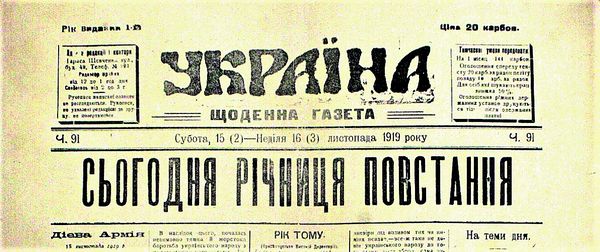 |
| The newspaper "Ukrayina" editorial on the first anniversary of the Directorate uprising |
The status of an illegal secretive meeting was far from formal. Session participants had not been elected. Some of them belonged to UNUnion presidium, however it is unlikely that parties or organizations they represented had made legitimate decision regarding their presence at the session or delegated the right to elect the Directory.
Actually, UNUnion presidium consisted of 28 members; while the session was attended by only 14 persons (the list might be incomplete). Taking into account that some of the attendees were not member of UNUnion presidium — at the very least — the military, the degree of the session legitimacy seems somewhat dubious.
The legitimacy of the Directorate election can only be drawn from its feasibility to the revolutionary cause.
Were Yevgen Konovalets or Symon Petliura among the session attendees? At the time, Yevhen Konovalets' Sich Riflemen regiment was the major military force to support anti-hetman rebellion. In his article "Causes to the History of the Ukrainian Revolution" ["Причинки до історії Української революції"] colonel does not mention being present at the meeting that elected the Directory.
Though, due to the extreme importance of the event his presence, at first glance, would be logical. The "Ukrayina" newspaper also did not mention Yevhen Konovalets among the session attendees. The only person to point at Yevhen Konovalets' presence at the session was Mykyta Shapoval.
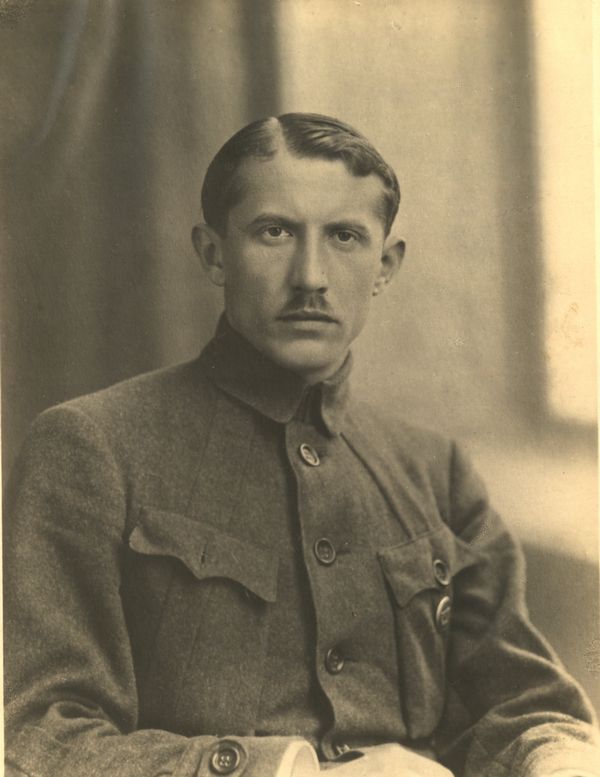 |
| Colonel Yevgen Konovalets |
Dmytro Dontsov (did not attend the session) later wrote, that upon November 13 afternoon session of UNUnion, he heard from Yevhen Konovalets, that the colonel was "taking off now to Bila Tserkva".
This indicates that Yevhen Konovalets indeed was in Kyiv that day, but was planning on leaving for Bila Tserkva. Taking into account that Bila Tserkva is about 70 kilometers away from Kyiv, it would take a train 2 to 3 hours to cover the distance depending on the number of stops and other factors.
According to Osyp Nazarchuk's testimony, he left for Bila Tserkva from Kyiv together with Volodymyr Shukhevych and Yevhen Konovalets on November 11, meaning that in the morning of November 12, Yevhen Konovalets was in Bila Tserkva. Of course, he could leave for Kyiv and get to the evening session on November 13.
It is proven for a fact that the colonel was in Kyiv on November 15, when he met with Pavlo Skoropadsky in attempt to persuade the Hetman to call of "federation" charter. And "at night with Volodymyr Vynnychenko (disguised as railwayman) I took the last train to Bila Tserkva". From the above we cannot conclude that Yevhen Konovalets took part in November 13's session that formed Directory.
Another essential issue is the reason Symon Petliura did not attend the meeting that elected Directory, and where he was at on November 13.
According to Volodymyr Vynnychenko, he personally provided Petliura with "the address of the place where representatives of organizations and armed forces were supposed to meet for electing the Directory". However, Petliura did not attend the meeting. There is an explanation to his absence.
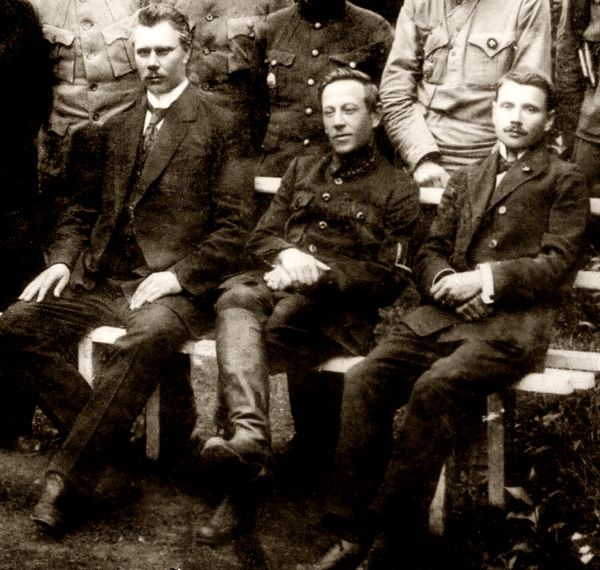 |
| Symon Petliura (in the centre) |
Fundamental issue of Petliura's membership in the Directory, according to Mykyta Shapoval, was settled at an earlier date. Symon Petliura couldn't leave Kyiv on a whim at such decisive moment — thus his absence was agreed upon with Volodymyr Vynnychenko and Mykyta Shapoval.
For conspiracy reasons, the cause of Symon Petliura's absence was not disclosed at the meeting that elected Directory. Minister of Internal Affairs Igor Kistiakivsky's telegram of November 12 on immediate arrest of Symon Petliura played certain part in the course of events.
Besides, additional circumstances dictated the need for Petliura's presence in Bila Tserkva. Galician envoys — Osyp Nazaruk and Volodymyr Shukhevych — had just arrived to the Sich Riflemen quarters. They were trying to persuade Sich Riflemen to immediately leave for Galicia for defense against Polish "invasion".
Had they succeeded in that endeavor, the anti-hetman uprising would most definitely be a failure (at least at the time).Symon Petliura who was respected and trusted by the Sich Riflemen and was, in a way, their "delegate" at the Directory, had to keep the situation under control.
The session. By November 13 the situation in Kyiv got aggravated. The morning session of the Hetman Government addressed the issue of permission to hold National Congress on November 17. The Council of Ministers prohibited it as the opposition forum.
Hetman realized, that such decision "will cause the Ukrainian leftist parties to resort to aggressive measures", so he decided to "create a more decisive council [of ministers]", and, in his own words, side with "the more suitable for achieving that end military forces that I decide to rely on: Russian officer corps and my Serdiutska division ".
That same day, November 13, "the full-assembly meeting of the National Union presidium was reported to on uprising matter. Everyone agreed, no one contradicted […] Scheduled for 8 pm conspiratorial session of the National Union presidium with our military representatives".
To prepare for the session the organizers needed a place that could host couple dozen people; where party's arrival would not arise interest in the Hetman Security Service; and where own security could be provided.
The Ministry of Railways was considered the best suitable option, since, as was previously mentioned, several conspirators had access to its premises.
According to the "Ukrayina" newspaper the meeting should have been conducted "in conspirative and secretive setting, so quietly and discreetly, that 'no man's eye would see, no man's ear would hear'".
They came to the meeting one by one — from different parts of the city. The days were still short in the midst of November — by 8 pm it had already been dark. Watch-guards settled in position around the Ministry building, "by the street-light they looked like some black human-shaped figures, dark-grey shadows".
In case of police arrival the conspirators would have exited the building through the back door leading to the neighboring backyard. By the way, until this day the building has remained virtually unchanged, so that passage is still there.
Most likely there was a list for entering the building, or the conspirators used some code, since it is unlikely that the guards knew every member of the session personally.
Rostyslav Lashchenko told that the start of the session was a bit delayed, and he, together with Opanas Andriyevsky, at O. Stokoza's invite, took a tour of the Ministers office. "We could feel that this office did not belong to the Hetman's minister anymore and that shortly a new master enter this office".
The historic session took place at O. Stokoza's office at room #6. Normally, taking about O. Stokoza, people mention that he was a special affairs officer with the minister. At that time, such officer's responsibilities included pretty specific tasks, most of those — secret assignments.
Thus, O. Stokoz was a close confidant of the Minister of Railways Borys Butenko, was informed about many of his affairs, and was trusted by the minister. This raises the question: how well was Borys Butenko informed on the uprising? Unfortunately, there is still no final (documented) answer to this question.
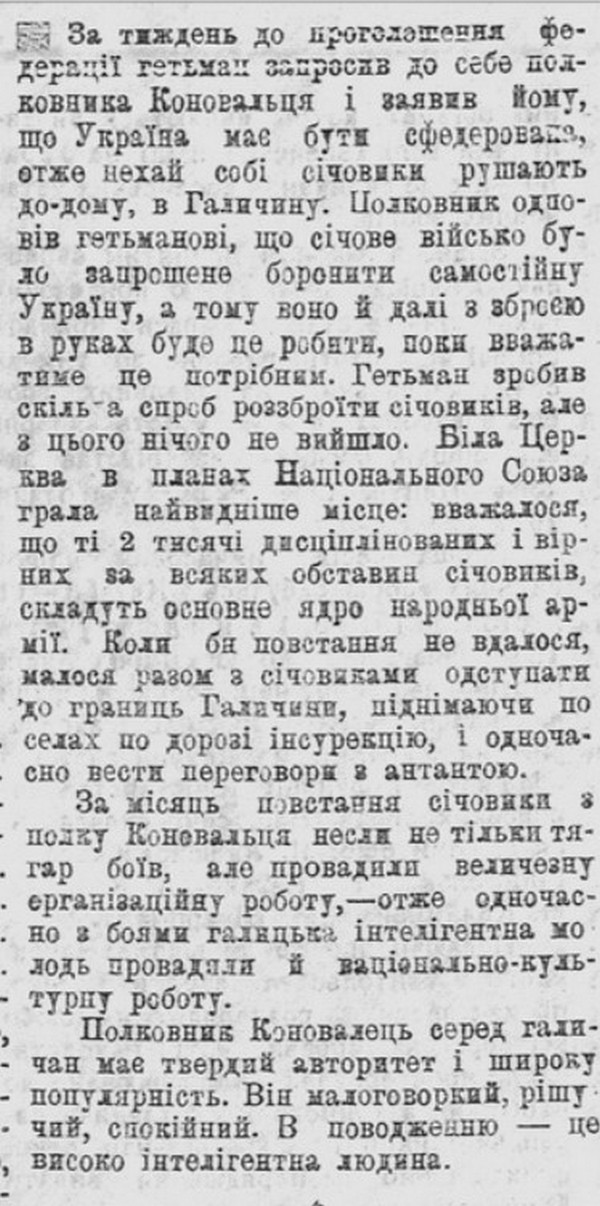 |
| The newspaper "Nova rada" on the meeting of Yevgen Konovalets with Pavlo Skoropadsky |
"The last person to join, was Vynnychenko, who set, as the Head of the National Union, at the "presidential" table, and F. Shvets and P. Didushok set next to him. M. Shapoval almost never set down, he was extremely nervous. In a few minutes V. Vynnychenko announced the start of the session, and made a short opening report calling to "take up arms".
First, the session deliberated on the qualitative composition of the Directory. There were few suggestions. Three-member and five-member Directory versions had been discussed. There was a suggestion to form Directory of UNUnion presidium members — meaning 28 persons.
As the result of the discussion it was decided to form a five-member Directory. However, in light of the situation, only three members were to be elected immediately, and they would be tasked with selecting two more persons to form the Directory.
Thus, Oleksandr Yanko, representative for the Ukrainian Socialist-Revolutionary Party and the Peasants Union, formally suggested three candidates — Volodymyr Vynnychenko, Symon Petliura and Mykyta Shapoval. Mykyta Shapoval attests to that: "The Directory had really been drafted as consisting of Vynnychenko, Petliura and myself", however in the course of the session the situation changed…
To the question regarding consent of absent Petliura's, Andriy Makarenko "asserted he specifically discussed this issue with him, and Petliura agreed to be a candidate". Petliura's consent for being co-opt for Directory was also collaborated by Volodymyr Vynnychenko. There was no objections, and Andriy Makarenko suggested voting with no further discussion.
However, suddenly Mykyta Shapoval came forward to recuse himself from the vote. That was quite unexpected, since, up until that time, he was one of the most active conspirators, and there was no objections whatsoever regarding his candidacy.
That's how he later explained his recusal: "I asked for the floor and said that I was firmly opposed to my candidacy. Everyone turned their heads – why? […] I said I didn't consider myself capable of taking up such a role that demanded first and foremost enormous and constant commitment" .
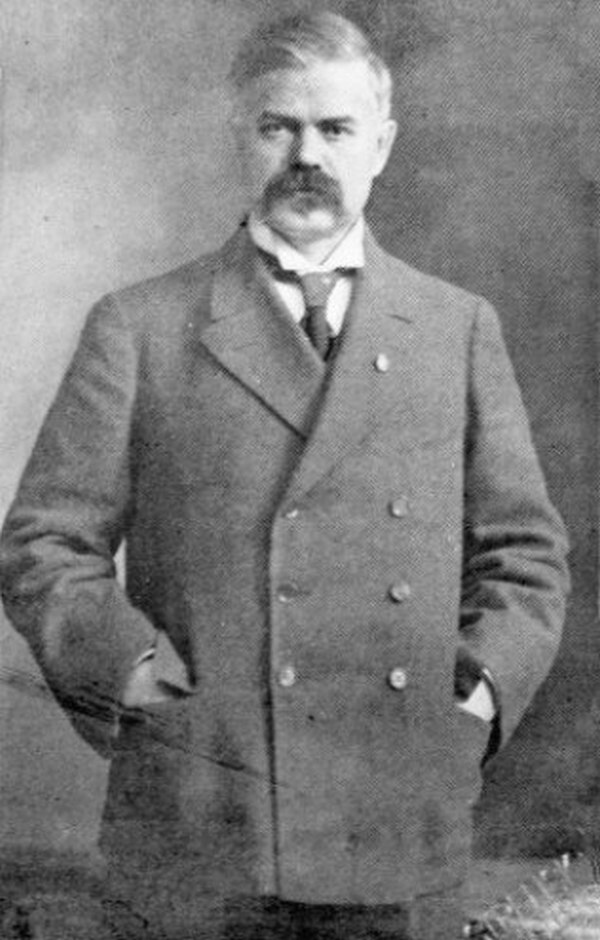 |
| Mykyta Shapoval recused himself from the Directory |
We can only assume that later, when the uprising had turned a success, Mykyta Shapoval was deeply sorry for his decision to give up on membership at the Directory.
In his "Biography outline" ["Схема життєпису"] in the 50-s Mykyta Shapoval points to a somewhat different reason for his decision: "I trust neither Petliura, nor Vynnychenko, as they are ambitious people unable to put public affairs above their personal 'selves' . […] I would have been deeply hurt, had someone suspected me of "careerism" (as an expression of egoism) that's why I declined the Directory membership, implying that I would take on any assignment, even if it meant being a soldier" .
Andriy Makarenko, Volodymyr Vynnychenko and Oleksandr Yanko still tried to persuade Mykyta Shapoval to take on the position. However he said that: "my presence in the Directory will brand it as Bolshevik. As you know, ever since 1917, and later, I had the reputation of a Bolshevik. […] Everyone will say that I am a Bolshevik since that is who I am known to be. They will not say this about Vynnychenko and Petliura. Pick them the third [member]."
Shapoval immediately nominated his college member of Central Committee of the Ukrainian Socialist-Revolutionary Party (UPSR) Oleksandr Yanko. Yanko also recused himself by citing the same "Bolshevik reputation" for a reason.
Something was needed to be done to salvage the situation, so session members turned to the present member of the UPSR and the Vice-Rector of the Ukrainian University, geology professor, Fedir Shvets, who represented the All-Ukrainian Peasants Society at UNUnion.
First, Shvets also refused, but soon he agreed to the nomination: "If that's what we need — I'll do it", firmly said Shvets and pounded his fist on the table, as if underscoring his consent".
Regarding the party affiliation, Volodymyr Petliura and Volodymyr Vynnychenko represented Ukrainian Social Democratic Labour Party (USDRP), and Fedir Shvets represented UPSR and Peasants Society. Concurrently, non-party "Railwayman", the Ministry of Railways department director, was co-opted to Directory as the representative of highly organized and active group of the Ukrainian Railway officers and stuff.
To add political "colouring" and at request of present Head of UPSS [Ukrainian Party of Socialist-Independists] Oleksandr Makarenko, Opanas Andriyevsky was co-opted to the Directory as the representative of UPSS.
This completed the Directory, which happened, according to Rostyslav Lashchenko memoirs, "at a little past ten" in the evening. Volodymyr Vynnychenko headed the Directory. It looks that was an obvious choice, that's why the mere fact of electing the head of Directory had not been recorded either in attendees memoirs, or in "Ukrayina" newspaper.
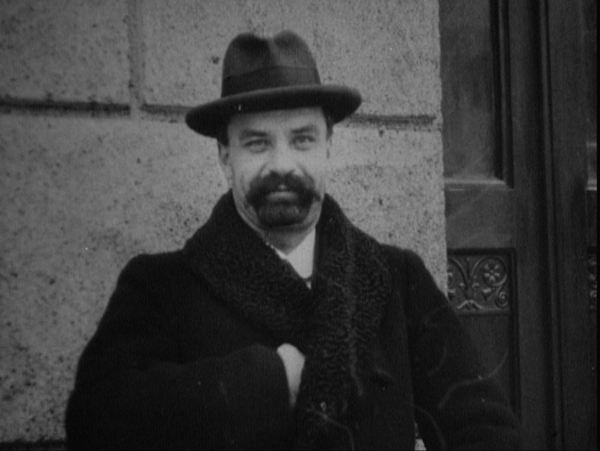 |
| The First Head of the Directory Volodymyr Vynnychenko. Image from 1918 documentary. |
"After electing Directory the meeting proceeded with discussion of cornerstone issues to be declared by the new Government". Fedir Shvets and Mykyta Shapoval suggested that upon victory the Directory should issue a State Act reinstating Central Council [Central Rada].
Volodymyr Vynnychenko was opposed. He had the following reasons for rejecting the idea: Central Rada had already played its role; everyone still remembered its mistakes, especially the unfortunate Land Act, so returning to this form of Government would be inadvisable.
To that logic also added Volodymyr Vynnychenko's aspiration of being "the first" person, and not "the second" he used to be under the Central Rada. The general opinion of those present was leaning towards the necessity of setting the policy agenda focused on conducting the Constituent Assembly, the elections to which had already been held and the assembly date — set.
Future legal and juridical standing of the Directory was not discussed (except for the general political definitions). It also was not defined to whom and in what way would it transfer (or would not transfer) power, or even should the Directory continue to exist, and whether it was an executive body or a legislative one. It is noteworthy, that no document or legal act was discussed at the meeting, and no record of the meeting was kept.
The session started out with a delay, at about 8:30 pm, and ended shortly after 10 pm. That's when attendees started leaving. Only the Directory members and the military stayed in as they needed to discuss further actions.
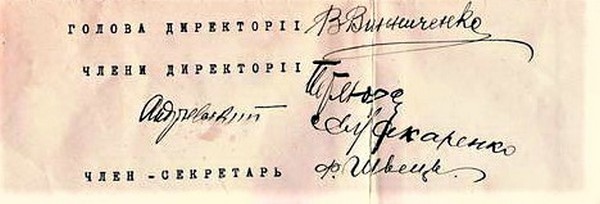 |
| Signatures of the Directory members |
Hetman Special Services knew about the conspirators' secretive meeting; however they were unable to identify the exact place where it was held. Next evening and the following day they were actively looking for the meeting participants. State guard effort resulted in the arrest of the Kyiv guard Mounted Battalion Commander Mykola Arkas (meeting attendee).
He said that no matter what "the uprising will break out anyway". It remains unknown whether Hetman Security Service found out any detail from Mykola Arkas. It looks like they didn't. Pavlo Skoropadsky writes, that, say, the interrogation of the prisoner revealed "conspiracy" and conspirators' plans "of seizing me and the government by surprise, so to say".
Upon creation of the Directory, Volodymyr Vynnychenko stayed in Kyiv "with the purpose of compiling and issuing appeal on behalf of the Directory". Next morning the appeal was being printed in small print runs at various places.
The State Security found out that portion of the print was run on a hectograph at the Public Health Ministry. The Ministry premises were searched, but the printed copies were not recovered by the Security.
The Directory members and other conspirators left in a hurry for Bila Tserkva, where Symon Petliura had been staying since November 12.
Meanwhile, other Directory members were hiding at Kyiv safe houses. Rostyslav Lashchenko states: "All the members made it to safety (Vynnychenko was staying at Mariyinsko-Blagovishchenska Street, Shvets and Andriyevsky at their acquaintance's private homes, and Makarenko at Dymiyivka)".
The Directory members Fedir Shvets and Opanas Andriyevsky managed to privately escape from Kyiv unnoticed, and got to Bila Tserkva.
It is known for a fact, that Fedir Shvets left Kyiv on a train Kyiv-Sevastopol on November 14. He was seen at the train station by Volodymyr Kedrovsky who was also leaving for Bila Tserkva with Fedir Chernyk and other Sich Riflemen.
There, on the platform "was standing F. Shvets wrapped in some kind of wooly coat, or a Caucasian sirak, turned to the wall as if he was inspecting something out there". They took separate train cars, and only at Bila Tserkva got to the Sich Riflemen quarters together.
Volodymyr Vynnychenko stayed in Kyiv for a bit longer. He left for Bila Tserkva together with Yevgen Konovalets on November 15. This is supported by Sich Riflemen' Commander memories: "with Volodymyr Vynnychenko (disguised as railwayman) I took the last train to Bila Tserkva".
All of the Directory members now were in Bila Tserkva, except for Andriy Makarenko, who was unable to escape from Kyiv and "almost for a week and a half hid at Demiyivka, and only during the negations of S. Petliura's Headquarters with the German Council of Army Members in Kyiv, in disguise, managed to escape with the German department to Fastiv".
Thus, on November 15 the Directory (except Andriy Makarenko) gathered in Bila Tserkva, and from here it lead the first stage of anti-hetman uprising.
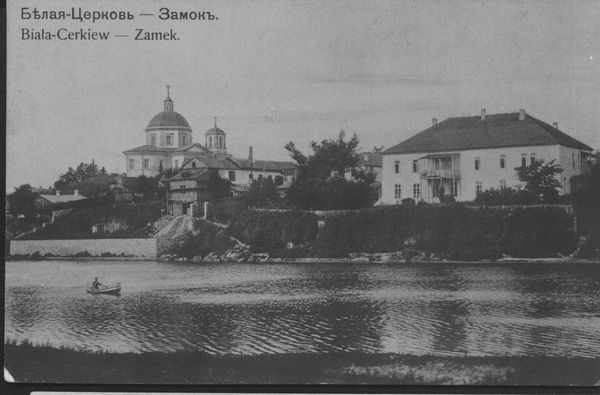 |
| Bila Tserkva. Postcard. Beginning of the 20th century. |
Almost simultaneously with Volodymyr Vynnychenko's appeal, another document calling for an uprising was publicized and distributed. This document was called a Universal, which was supposed to point to a link with the Ukrainian People's Republic.
The Universal was signed by the Chief Ataman [Commander in Chief] of the UNR Army Symon Petliura and the Chief of Stuff General Oleksandr Osetsky. In the very first paragraph the document said: "On the order of the Directory of the Ukrainian People's Republic I take charge of all the Ukrainian Army as its Chief Ataman".
Mykola Kovalevsky, who arrived at Sich Riflemen quarters late at night November 14, saw there "Konovalets half lying on a bed looking tired, resting his feet against the floor, S.V. Petliura who was standing in a trench coat, his shoulders turned to the door, a man, unfamiliar to me [O. Nazaruk], was nervously pacing the room, with scarf on his throat and pince-nez on his nose. They were discussing the draft of anti-hetman appeal".
So, according to Nazaruk, he took it upon himself to prepare the text of the Universal calling for support of the Directory: "Upon writing the appeal I took it to officer's mess where Directory members were having dinner with few of our officers. I read the text of the appeal and they accepted it. Petliura added introduction calling against hetman — and it was sent out to print right away […] the uprising should have started tomorrow".
This way some two hours on November 13 had changed the Ukrainian history….

